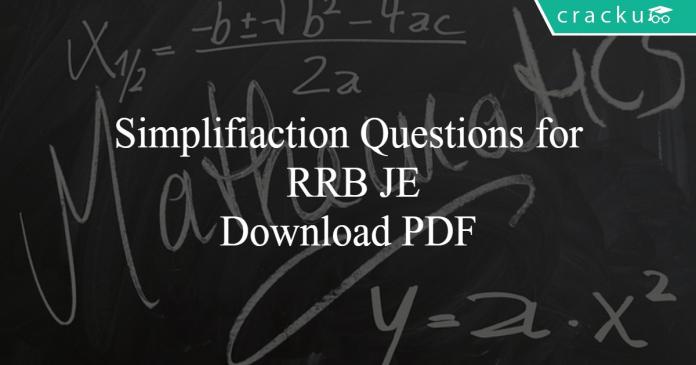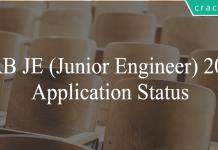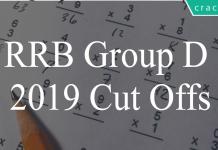Simplification Questions for RRB JE PDF
Download Top 20 RRB JE Simplification Questions and Answers PDF. RRB JE Maths questions based on asked questions in previous exam papers very important for the Railway JE exam
Download Simplification Questions for RRB JE PDF
Download RRB JE Previous Papers PDF
Question 1: If the roots of the equation $2x^{2}-9x+7$=0 are p and q then the equation with roots as p+1 and q+1 is ?
a) $ 2x^{2}-13x+18$=0
b) $ 2x^{2}-11x+16$=0
c) $ 2x^{2}+11x-16$=0
d) $ 2x^{2}+13x-18$=0
Question 2: If $b-\frac{1}{b}$=7, then what is the value of $b+\frac{1}{b}$
a) $\sqrt{51}$
b) $\sqrt{52}$
c) $\sqrt{50}$
d) $\sqrt{53}$
Question 3: If $a+\frac{1}{a}$=4, then what is the value of $a-\frac{1}{a}$
a) $\sqrt{11}$
b) $\sqrt{12}$
c) $\sqrt{10}$
d) $\sqrt{13}$
Question 4: If $a^3+b^3+c^3 = 3abc$, then find the value of $(a+b)^2-c^2$.
a) -1
b) 1
c) 0
d) 2
Question 5: If $x^2 + y^2 + x^{-2} + y^{-2}$ = 4 then what is the value of $x^4 + y^4$ ?
a) 0
b) -1
c) 2
d) 4
Question 6: If $x^2 + 1 = 2x$, then find $x^3+\dfrac{1}{x^3}$.
a) 4
b) 3
c) 2
d) 0
18000+ Questions – Free SSC Study Material
Question 7: Find the value of x from the given equations.
7x + 3y + 5z = 27
6x + 6y + 10z = 14
a) 4
b) 11
c) 5
d) 9
Question 8: Find the value of $1+\dfrac{1}{1+\dfrac{1}{1+\dfrac{1}{1+\dfrac{1}{7}}}}$.
a) $\dfrac{38}{21}$
b) $\dfrac{38}{23}$
c) $\dfrac{36}{23}$
d) $\dfrac{39}{20}$
Question 9: If $x+\dfrac{1}{x} = 3, x^6+\dfrac{1}{x^6} = ?$
a) 314
b) 322
c) 328
d) 316
Question 10: Find the value of x from the given equations.
7x + 3y + 5z = 27
6x + 6y + 10z = 14
a) 4
b) 11
c) 5
d) 9
RRB JE Free Mock Test (latest pattern)
Question 11: Find the value of $1+\dfrac{1}{1+\dfrac{1}{1+\dfrac{1}{1+\dfrac{1}{7}}}}$.
a) $\dfrac{38}{21}$
b) $\dfrac{38}{23}$
c) $\dfrac{36}{23}$
d) $\dfrac{39}{20}$
Question 12: If $x+\dfrac{1}{x} = 3, x^6+\dfrac{1}{x^6} = ?$
a) 314
b) 322
c) 328
d) 316
Question 13: Find the value of $1+\dfrac{1}{1+\dfrac{1}{1+\dfrac{1}{1+\dfrac{1}{4}}}}$.
a) $\dfrac{21}{15}$
b) $\dfrac{23}{14}$
c) $\dfrac{24}{13}$
d) $\dfrac{23}{11}$
Question 14: Find the value of $1+\dfrac{1}{1+\dfrac{1}{1+\dfrac{1}{1+\dfrac{2}{7}}}}$.
a) $\frac{37}{25}$
b) $\frac{41}{22}$
c) $\frac{41}{25}$
d) $\frac{35}{19}$
Question 15: If $x^{4}+(\frac{1}{x})^{4}$=34 then what is the value of $x-1/x$
a) 2
b) 6
c) 8
d) 4
Daily Free Online Tests for RRB Exams
Question 16: If $x^{4}+(\frac{1}{x})^{4}$=727 then what is the value of $x^{3}-(\frac{1}{x})^{3}$
a) 140
b) 138
c) 134
d) 136
Question 17: If $x^{4}+(\frac{1}{x})^{4}$=119 then what is the value of $x^{3}-(\frac{1}{x})^{3}$
a) 36
b) 24
c) 42
d) 30
Question 18: If $p + \frac{1}{p} = 3$, then find the value of $p^6 + \large\frac{1}{p^6}$.
a) 322
b) 348
c) 329
d) 342
Question 19: If $px^3 + qx^2 – 19x – 30 = 0$ is completely divided by $x^2 + 5x + 6$, find the value of $(p, q)$.
a) (1,0)
b) (2,1)
c) (1,0)
d) (4,1)
Question 20: If $l^{3} + m^{3}$ = -218 and $lm = -35$ , then what is the value of $l + m$?
a) -6
b) -2
c) -4
d) -5
General Science Notes for RRB Exams (PDF)
Answers & Solutions:
1) Answer (A)
Given $2x^{2}-9x+7=0$
$ 2x^{2}-2x-7x+7$=0
$2x(x-1)-7(x-1)$=0
$(2x-7)(x-1)$=0
p=3.5 and q=1
Roots of the new equation are p+1 an q+1 i.e 4.5 and 2
$(x-4.5)(x-2)$=0
$ 2x^{2}-13x+18$=0
2) Answer (D)
$b-\frac{1}{b}$=7
Squaring on both sides we have
$b^{2}-2(b)(1/b)+(\frac{1}{b})^{2}$=49
$b^{2}+(\frac{1}{b})^{2}$=49+2 = 51
Adding 2 on both sides
$b^{2}+2+(\frac{1}{b})^{2}$=51+2
$(b+\frac{1}{b})^{2}$=53
$b+\frac{1}{b}$=$\sqrt{53}$
3) Answer (B)
$a+\frac{1}{a}$=4
Squaring on both sides we have
$a^{2}+2(a)(1/a)+(\frac{1}{a})^{2}$=16
$a^{2}+(\frac{1}{a})^{2}$=14
Subtracting 2 on both sides
$a^{2}-2+(\frac{1}{a})^{2}$=14-2
$(a-\frac{1}{a})^{2}$=12
$a-\frac{1}{a}$=$\sqrt{12}$
4) Answer (C)
If $a^3+b^3+c^3 = 3abc$, then $a+b+c = 0$.
$(a+b)^2-c^2 = (a+b+c)(a+b-c) = 0$
5) Answer (C)
$x^2 + y^2 + x^{-2} + y^{-2} = 4$
⇒ $(x^2 + \frac{1}{x^2} – 2) + (y^2 + \frac{1}{y^2} – 2) = 0$
⇒ ${(x – \frac{1}{x})}^2 + {(y – \frac{1}{y})}^2 = 0$
Sum of two squares is zero when both the numbers are zero.
⇒ $x – \frac{1}{x}$ = 0 and $y – \frac{1}{y} = 0$
⇒ $x = 1$or $-1$ and $y = 1$ or $-1$
In all the cases, $x^4 + y^4 = 2$
Hence, option C is the correct answer.
6) Answer (C)
Given, $x^2 + 1 = 2x$
Dividing with x on both sides
⇒ $x+\dfrac{1}{x} = 2$
Cubing on both sides
⇒ $(x+\dfrac{1}{x})^3 = 2^3$
⇒ $x^3+\dfrac{1}{x^3}+3\times x\times \dfrac{1}{x}(x+\dfrac{1}{x}) = 8$
⇒ $x^3+\dfrac{1}{x^3}+3\times2 = 8$
⇒ $x^3+\dfrac{1}{x^3} = 8-6 = 2$
7) Answer (C)
7x + 3y + 5z = 27 → (1)
6x + 6y + 10z = 14 → (2)
Multiplying equation (1) by 2 and subtracting (2) from (1) we get
8x = 40
⇒ x = 5
Hence, option C is the correct answer.
8) Answer (B)
$1+\dfrac{1}{1+\dfrac{1}{1+\dfrac{1}{1+\dfrac{1}{7}}}} = 1+\dfrac{1}{1+\dfrac{1}{1+\dfrac{1}{\dfrac{8}{7}}}}$
$= 1+\dfrac{1}{1+\dfrac{1}{1+\dfrac{7}{8}}}$
$= 1+\dfrac{1}{1+\dfrac{1}{\dfrac{15}{8}}}$
$= 1+\dfrac{1}{1+\dfrac{8}{15}}$
$= 1+\dfrac{1}{\dfrac{23}{15}}$
$= 1+\dfrac{15}{23}$
$= \dfrac{38}{23}$
9) Answer (B)
Given, $x+\dfrac{1}{x} = 3$
Squaring on both sides
$(x+\dfrac{1}{x})^2 = 3^2$
$x^2+\dfrac{1}{x^2}+2\times x \times \dfrac{1}{x} = 9$
$x^2+\dfrac{1}{x^2}+2 = 9$
$x^2+\dfrac{1}{x^2} = 7$
Cubing above equation on both sides
$(x^2+\dfrac{1}{x^2})^3 = 7^3$
⇒
$x^6+\dfrac{1}{x^6}+3\times x^2\times \dfrac{1}{x^2}((x^2+\dfrac{1}{x^2}}) = 343$
⇒ $x^6+\dfrac{1}{x^6}+3\times7 = 343$
⇒ $x^6+\dfrac{1}{x^6}+21 = 343$
⇒ $x^6+\dfrac{1}{x^6} = 343-21 = 322$
10) Answer (C)
7x + 3y + 5z = 27 → (1)
6x + 6y + 10z = 14 → (2)
Multiplying equation (1) by 2 and subtracting (2) from (1) we get
8x = 40
⇒ x = 5
Hence, option C is the correct answer.
11) Answer (B)
$1+\dfrac{1}{1+\dfrac{1}{1+\dfrac{1}{1+\dfrac{1}{7}}}} = 1+\dfrac{1}{1+\dfrac{1}{1+\dfrac{1}{\dfrac{8}{7}}}}$
$= 1+\dfrac{1}{1+\dfrac{1}{1+\dfrac{7}{8}}}$
$= 1+\dfrac{1}{1+\dfrac{1}{\dfrac{15}{8}}}$
$= 1+\dfrac{1}{1+\dfrac{8}{15}}$
$= 1+\dfrac{1}{\dfrac{23}{15}}$
$= 1+\dfrac{15}{23}$
$= \dfrac{38}{23}$
12) Answer (B)
Given, $x+\dfrac{1}{x} = 3$
Squaring on both sides
$(x+\dfrac{1}{x})^2 = 3^2$
$x^2+\dfrac{1}{x^2}+2\times x \times \dfrac{1}{x} = 9$
$x^2+\dfrac{1}{x^2}+2 = 9$
$x^2+\dfrac{1}{x^2} = 7$
Cubing above equation on both sides
$(x^2+\dfrac{1}{x^2})^3 = 7^3$
⇒ $x^6+\dfrac{1}{x^6}+3\times x^2\times \dfrac{1}{x^2}((x^2+\dfrac{1}{x^2}}) = 343$
⇒ $x^6+\dfrac{1}{x^6}+3\times7 = 343$
⇒ $x^6+\dfrac{1}{x^6}+21 = 343$
⇒ $x^6+\dfrac{1}{x^6} = 343-21 = 322$
13) Answer (B)
$1+\dfrac{1}{1+\dfrac{1}{1+\dfrac{1}{1+\dfrac{1}{4}}}} = 1+\dfrac{1}{1+\dfrac{1}{1+\dfrac{1}{\dfrac{5}{4}}}}$
$= 1+\dfrac{1}{1+\dfrac{1}{1+\dfrac{4}{5}}}$
$= 1+\dfrac{1}{1+\dfrac{1}{\dfrac{9}{5}}}$
$= 1+\dfrac{1}{1+\dfrac{5}{9}}$
$= 1+\dfrac{1}{\dfrac{14}{9}}$
$= 1+\dfrac{9}{14}$
$= \dfrac{23}{14}$
14) Answer (C)
$1+\dfrac{1}{1+\dfrac{1}{1+\dfrac{1}{1+\dfrac{2}{7}}}} = 1+\dfrac{1}{1+\dfrac{1}{1+\dfrac{1}{\dfrac{9}{7}}}}$
$= 1+\dfrac{1}{1+\dfrac{1}{1+\dfrac{7}{9}}}$
$= 1+\dfrac{1}{1+\dfrac{1}{\dfrac{16}{9}}}$
$= 1+\dfrac{1}{1+\dfrac{9}{16}}$
$= 1+\dfrac{1}{\dfrac{25}{16}}$
$= 1+\dfrac{16}{25}$
$= \dfrac{41}{25}$
15) Answer (A)
$x^{4}+(\frac{1}{x})^{4}$=34
Add 2 on both sides
$x^{4}+2+(\frac{1}{x})^{4}$=34+2
($x^{2}+\frac{1}{x^{2}})^{2}$=36
$x^{2}+(\frac{1}{x})^{2}$=6
Subtracting 2 on both sides
$x^{2}+(\frac{1}{x})^{2}-2$=4
($x-\frac{1}{x})^{2}$=4
$x-1/x$=2
16) Answer (A)
$x^{4}+(\frac{1}{x})^{4}$=727
Add 2 on both sides
$x^{4}+2+(\frac{1}{x})^{4}$=727+2
($x^{2}+\frac{1}{x^{2}})^{2}$=729
$x^{2}+(\frac{1}{x})^{2}$=27
Subtracting 2 on both sides
$x^{2}+(\frac{1}{x})^{2}-2$=27-2
x-1/x=5
Cubing on both sides we have
$x^{3}-(\frac{1}{x})^{3}-15$=125
$x^{3}-(\frac{1}{x})^{3}$=125+15=140
17) Answer (A)
$x^{4}+(\frac{1}{x})^{4}$=119
Add 2 on both sides
$x^{4}+2+(\frac{1}{x})^{4}$=119+2
$(x^{2}+\frac{1}{x^{2}})^{2}$=121
$x^{2}+(\frac{1}{x})^{2}$=11
Subtracting 2 on both sides
$x^{2}+(\frac{1}{x})^{2}-2$=11-2
x-1/x=3
Cubing on both sides we have
$x^{3}-(\frac{1}{x})^{3}-9$=27
$x^{3}-(\frac{1}{x})^{3}$=36
18) Answer (A)
Given,
$p + \large\frac{1}{p}$ $=$ $3$
Squaring both sides,
$p^2$ $+$ $\large\frac{1}{p^2}$ $+$ $2 \times p \times \large\frac{1}{p}$ $=$ $9$
$p^2 + \large\frac{1}{p^2}$ $=$ $7$
Cubing on both sides,
$p^6 + \large\frac{1}{p^6}$ $+ 3 \times p^2 \times \large\frac{1}{p^2}(p^2 + \large\frac{1}{p^2}) $ $= 343$
$p^6 + \large\frac{1}{p^6}$ $+ 3 (p^2 + \large\frac{1}{p^2})$ $=343$
$p^6 + \large\frac{1}{p^6}$ $+ 3 (7)$= $343$
$p^6 + \large\frac{1}{p^6}$ $=$ $343-21$
$p^6 + \large\frac{1}{p^6}$ $=$ $322$
19) Answer (C)
Given, $px^3 + qx^2 – 19x – 30 = 0$ is divisible by $x^2 + 5x + 6$
$x^2 + 5x + 6$ can be factorized as $(x + 2)(x + 3)$
x = -2 and x = -3 should satisfy $px^3 + qx^2 – 19x – 30 = 0$.
Substituting the values,
When, $x = -2$
$-8p + 4q + 8 = 0$ or $2p – q – 2 = 0$
When, $x = -3$
$-27p + 9q + 27 = 0$ or $3p – q – 3 = 0$
Subtracting both, $p = 1$
Substituting the value of $p = 1$, we get $q = 0$
Hence, $(p, q)$= $(1, 0)$.
20) Answer (B)
Given, $l^{3} + m^{3}$ = -218 and $lm = -35$
$(l+m)^{3} = l^{3}+ m^{3} + 3lm(l+m)$
$(l+m)^{3} = -218 + 3(-35)(l+m)$
$(l+m)^{3} = -218 -105(l+m)$
we need to solve 3rd degree equation
so,without solving, by verification, we get $l+m = -2$,
so the answer is option B.
DOWNLOAD APP FOR RRB FREE MOCKS
We hope this Simplification Questions for RRB JE Exam will be highly useful for your preparation.





